Overview:
AD Makepeace’s Sand Distribution Hub
Read Custom Soils
Efforts are underway to shut the AD Makepeace Co. sand distribution hub at 46 Federal Road, Carver MA. Read more about our legal efforts here.
Group says Read violates local zoning laws
AD Makepeace Co. mines its lands to supply Read, its sales and distribution company
Below: Read Custom Soils, 46 Federal Road, Carver MA. 
AD Makepeace owns and operates a regional sand and gravel distribution hub. Hundreds of trucks daily leave the site loaded with sand and gravel. In just a few hours in 2021, the public documented 258 sand and gravel trucks entering and exiting Read — that’s easily 500 trucks. Watch the video here.
Below: View of Read Custom Soils “soil blending” facility, 46 Federal Road, Carver MA
July 2023.
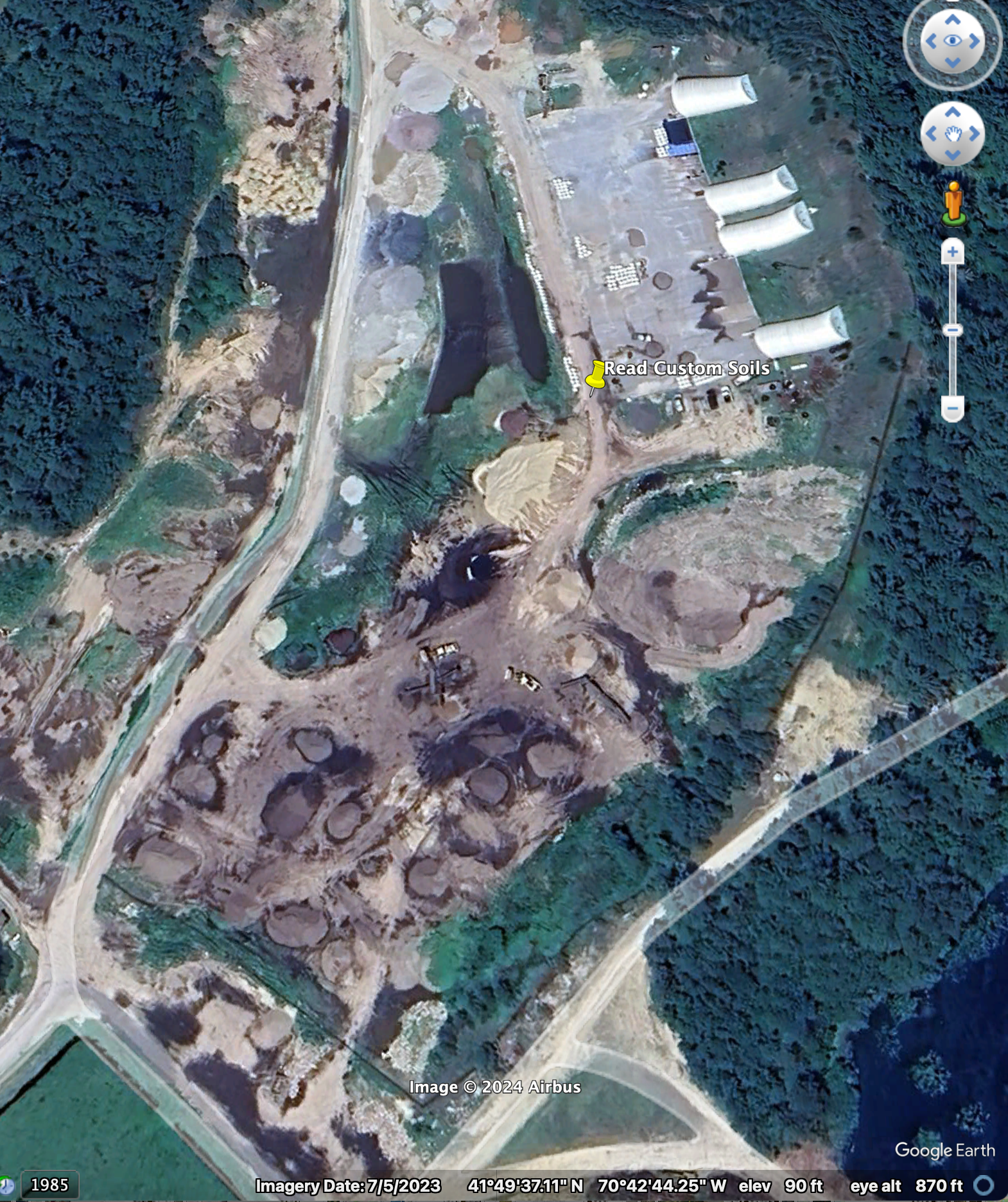
About AD Makepeace Co. & Read Custom Soils
AD Makepeace Cranberry Co., based in Wareham MA, claims to be the world’s largest cranberry grower and Massachusetts’ largest landowner. It owns about 12,000 acres of land in Southeastern Massachusetts. About 1,750 acres are used for cranberry agriculture. It derives most of its revenue from extracting and selling sand extracted from its lands. For decades, the cranberry industry has been a break even business at best. The Massachusetts Department of Agriculture calls cranberry farming a “beleaguered industry.” AD Makepeace mines for profits, not cranberry farming.
To evade local laws, cranberry companies claim their sand and gravel mining is “cranberry agriculture” and exempt from regulation. Find out more here.
Makepeace used to be a real cranberry company. In 2008, Makepeace deliberately pivoted from cranberry agriculture to real estate development and sand mining due to the poor economics of the cranberry industry. The cranberry industry is still not economically viable and survives on taxpayer subsidies and state grants. Read more in the Sand Wars Report, Part IV, “Economics of Sand” here.
The Massachusetts Department of Agriculture (MDAR) calls it ” beleaguered industry” and gives out millions in grants to sand mining companies who claim this is all cranberry agriculture.
Visit SandWars.org to see the groundbreaking Report: Sand Wars in Cranberry County: An investigation into the money, politics and corruption behind sand mining and its silent environmental crisis in Southeastern Massachusetts. Watch the video here.
AD Makepeace Co. profits from selling its “endless reserves” of sand
The core of Makepeace’s mining operations is about 2 square miles in the Carver-Wareham area on Federal Road. Watch the 2022 video for an overview of operations in the area.
Read operates on a portion of a large parcel of Makepeace land, about 536 acres that has a large cranberry bog on it. The Wankinko River runs through the bogs on the property. Because there is a bog on the large site, Makepeace claims the operation of Read and the mining is “cranberry agriculture” and exempt from local laws.
Makepeace strip mines its land around Read and brings the sand and gravel to Read to be distributed and sold. The map below shows AD Makepeace strip mine sites around Read within a 2 mile radius before in 2010 and as of 2023. These are just some of Makepeace’s sites. The trucks coming in and out of Read come from these sites and others in Southeastern Massachusetts.
This drone video shows Makepeace’s mining around Read. Between 2010 and 2024, Makepeace has strip mined up to 1,000 acres in the region for sand and gravel.
Below: 2010 Map showing AD Makepeace sand mines within 2 miles of Read. The areas are forested as of 2010.

Above: This is a Map of the same 2 mile radius in 2023. The strip mined areas are marked with a pin. Some are covered up with cranberry bogs.
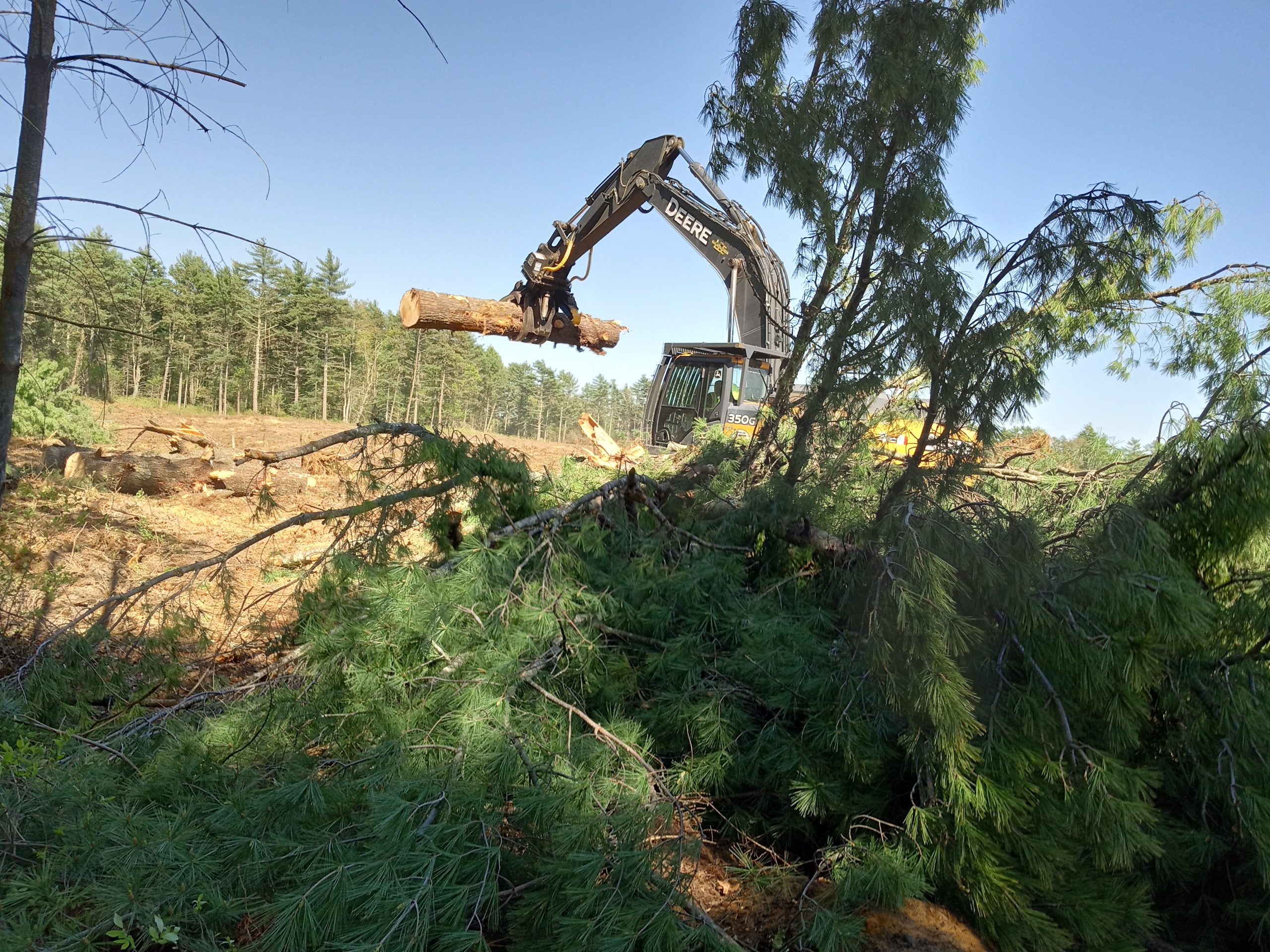
Above: 59 Federal Road, Carver MA, May 2024. 120 acre sand mine underway since 2016.
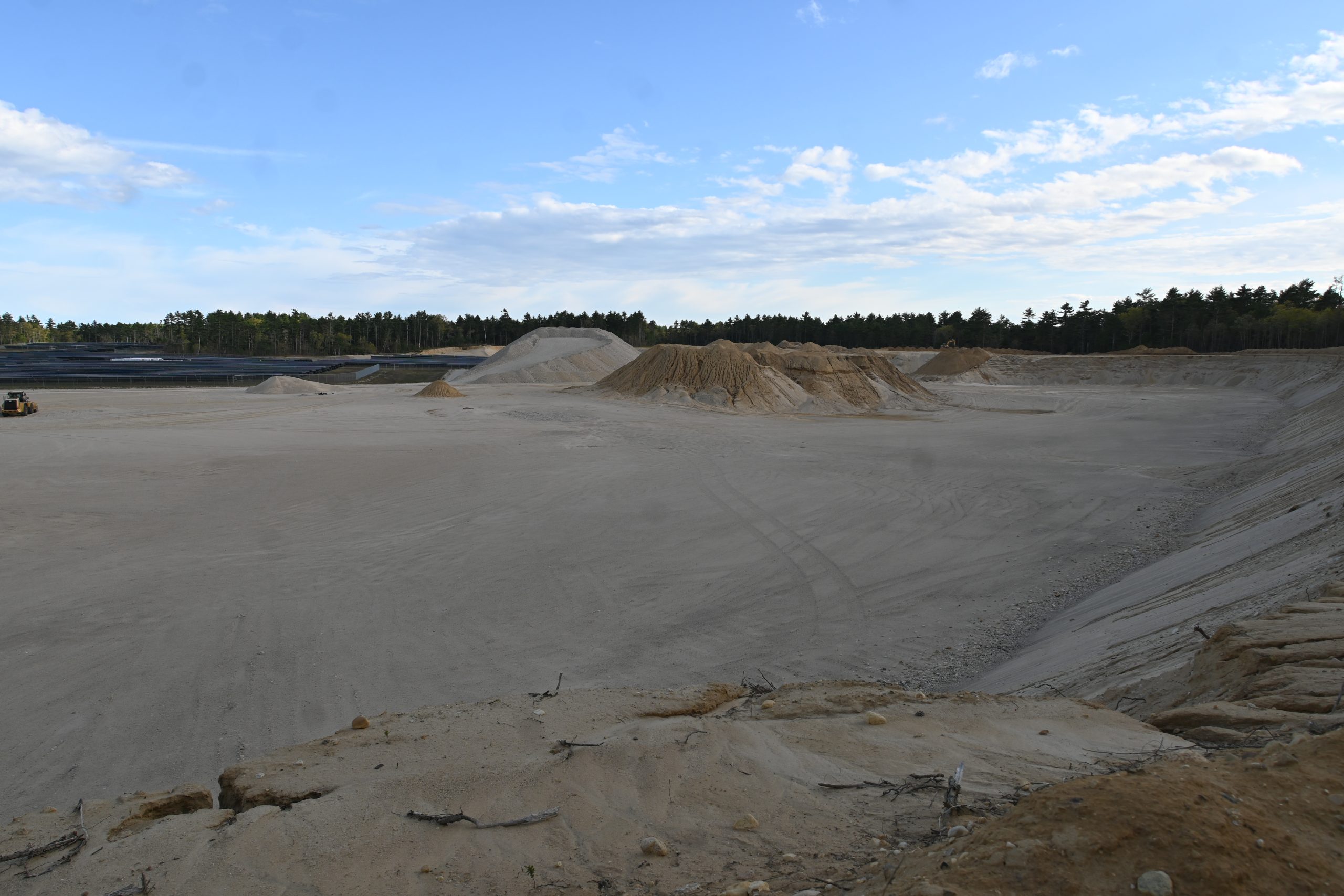
Above: AD Makepeace sand mine. 59 Federal Road in Carver, May 2024.
Read more about the massive mine at 59 Federal Road, Carver here.
AD Makepeace clears forest to access sand. In 2020, the Carver Earth Removal Committee gave AD Makepeace a permit to expand the mine by 85 acres to access $36 million in sand and gravel.

Above: 24 Federal Road in Carver MA, before mining. In 2019 the Carver Earth Removal Committee gave a permit to level the land by 40 feet and dig a pond.

Above: After AD Makepeace mining, July 2023. Over 24 acres of mining and dredging the Sole Source Aquifer for sand to supply Read Custom Soils. A former member of the Carver Earth Removal Committee, John Shurtleff, Jr. who operates a trucking company, was observed trucking sand from this site. Makepeace is mining at this site to supply sand to Read.
He voted to grant the Earth Removal Permit in 2019. See the Permit here. 24 Federal Road – Carver Earth Removal Permit to Makepeace signed by John Shurtleff and others. Read more about the involvement of Earth Removal Committee members in sand and gravel mining in Carver here.
Impact of Read’s truck traffic: dangerous and uncontrolled
For over a decade, the public has watched hundreds of trucks come in and out of Read daily. The volume of trucks is documented by videos and personal testimonials. Makepeace claims Read is a “manufacturing facility. A manufacturing facility does not have hundreds of tractor trailer trucks entering and leaving daily. Read’s trucks travel on interstate roads to deliver sand and gravel.
The operation causes dangerous traffic conditions on Federal Road and along the truck routes in Carver, Wareham and Plymouth. Federal Road is owned by the County and is a narrow rural road.
Here are some public documenting the excessive truck traffic from Read’s trucking hub:
- This video shows 258 trucks coming in and out of Read in just a few hours in 2021.
- This video shows 106 trucks in 14 minutes coming in and out of Read.
- In 2021, a sand and gravel tractor trailer flipped over on Federal Road coming from Read. Listen to this police report of how the sand and gravel truck almost killed a resident and his granddaughter because it was going so fast before it flipped.
- This video shows 14 trucks in 14 minutes coming from Read
- Makepeace’s own truck logs show hundreds of trucks a day (logs available on request)
- A court affidavit from a Wareham resident describes the hundreds of trucks a day leaving Read and Makepeace’s mines on Federal Road.
Below: Sand and gravel truck from Read flipped over on Federal Road, 2021.
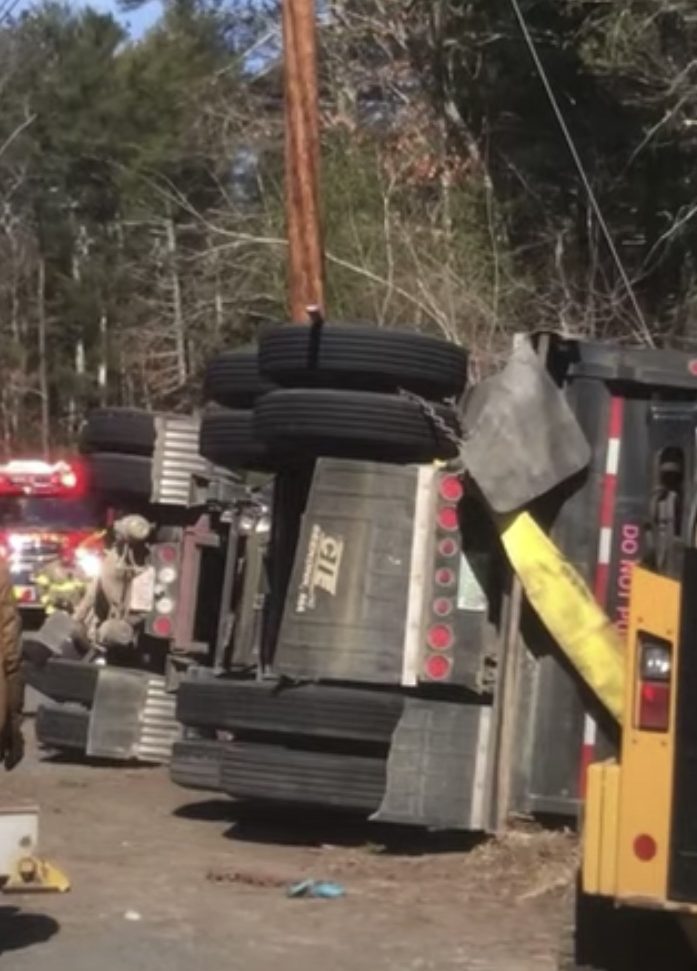
The trucks coming to and from Read go one of two ways to get to the highways to deliver sand: going south on Federal Road through Wareham to Route 25 or west on Cranberry Road to Route 58.
These are narrow country roads. Traveling them presents a safety risk when tractor trailers of sand are speeding by. The truck routes go through Environmental Justice communities in Carver and Wareham.
Below: July 2, 2024: Read Custom Soils truck on Interstate 495 hauling sand and gravel from the Pine Barrens..
“This is agriculture?!” says a local resident.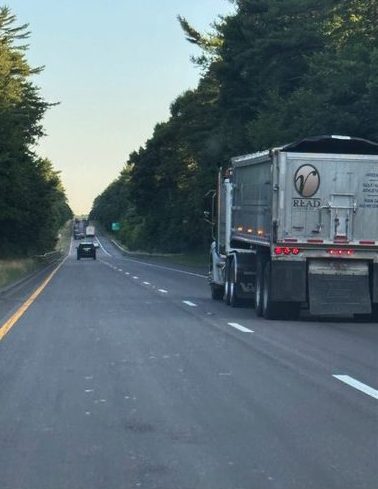
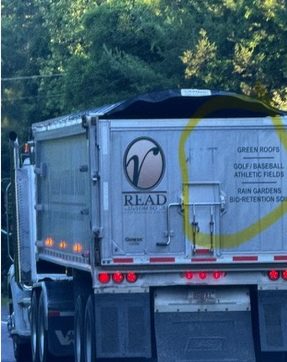
 The Carver Earth Removal Committee is allowing commercial mining around Read. There are 3 permits for mining pits in the area. Each permit allows 50 truck loads a day. Read more about Makepeace’s earth removal permits here.
The Carver Earth Removal Committee is allowing commercial mining around Read. There are 3 permits for mining pits in the area. Each permit allows 50 truck loads a day. Read more about Makepeace’s earth removal permits here.
In April, 2024, the Carver Earth Removal Committee approved expansion of the 120 acre mine at 59 Federal Road. Read more about this mine here.
This adds up to about 530,000 truck trips over 10 years — and that’s assuming Makepeace sticks to the law. There are even more trucks associated with Read. No one knows the actual number of trucks coming in and out of Read but it is alot!
Read more about the Carver Earth Removal Committee here. It is dominated by people who make money from sand and gravel mining or who buy sand from AD Makepeace.
All this trucking and sales of sand and gravel is just “cranberry agriculture”?
AD Makepeace claims that all this sand mining and Read’s trucking business is just “cranberry agriculture.” Watch here as the Makepeace CEO and President Jim Kane try to explain to the Carver Zoning Board of Appeals in September 2021 why after 20 years of mining at 46 Federal Road, Carver the cranberry bogs still are not built.

Impacts of sand mining: air pollution from carcinogenic silica sand dust
The sand being mined and shipped from Read is a silica sand. It causes cancer. There are no state laws to protect the public from air pollution from this sand.
The Town of Carver and the state Department of Environmental Protection ignore the public’s written, formal complaints about the emissions of sand from silica mines in Carver and the surrounding area.
In 2021, CLWC filed complaints with Carver about Makepeace and Read exposing the public to silica sand emissions. They ignored the requests. See one of the complaints here: 2021 April Dust Complaint Carver Board of Health-AirPollution

Impacts of AD Makepeace Co. sand mining on Environmental Justice Communities
Read is located in the heart of an Environmental Justice community. The Environmental Justice Community is shown in green on the map below.
An environmental justice community is one that is marginalized and overburdened with environmental pollution according to the state. Governor Healey has an office of Environmental Justice and Equity. The office is:
committed to ensuring a fair and equitable distribution of all environmental and energy benefits and burdens. We work with all agencies under the Secretary to ensure every policy and program is designed with equity at the center, ensuring all voices are heard and all voices are shaping the solutions. We are working hard to ensure there is meaningful engagement in all processes, resulting in more equitable public policies.

Impact of AD Makepeace sand mining on public and private drinking water
Makepeace’s sand and gravel mining harms the environment, including our drinking water. Read what the experts say here.
The sand and gravel that filter and protect underground drinking water wells are being removed. The Read trucking terminal is located over the Water Protection District in Carver, the Plymouth Carver Sole Source Aquifer, and near well protection zones for private and public wells. The trucking business has resulted in over 500,000 truckloads of sand and gravel being shipped off site.
Drinking water wells threatened says expert hydrologist. In 2022, CLWC went to court to try to stop Makepeace’s sand mining. World recognized hydrologist Scott W. Horsley testified that the mining operations at and around Read threaten drinking water. Figure 2 below is from Horsley’s court testimony. “Site 1” is the location of Read. “Site 2” is the 120 acre mining operation next to Cranberry Village. Read more here.

State subsidizes “cranberry companies” making millions from sand mining
According to the company’s CEO Jim Kane, Makepeace Cranberry Co. cannot survive without revenues from sand and gravel mining and sales. Kane states that Makepeace employs 60 independent trucking companies to transport sand and gravel to at least 10 asphalt and concrete manufacturers across New England, as well as other industrial and commercial customers, and some cranberry bogs. See Kane’s affidavit here: Affidavit of J. Kane
Below: MDAR website explains how taxpayer funds are used to subsidize companies like AD Makepeace whose primary source of revenue is sand mining.

Find statistics on the cranberry industry here. Since the early 2000s, Makepeace has earned its revenue primarily from sand mining rather than cranberry agriculture. They established Read Custom Soils on Federal Road in Carver to sell, ship, and distribute sand and gravel. Read is known as the largest supplier of sand and gravel in the Northeastern United States.
Listen to Kane’s plans for stripping land to put in solar here.
Other “cranberry” companies have also collected subsidies for sand and gravel mining. Read more about how North Weston Cranberry Co. in Carver MA collected state grants for a sand mining site.
Gov. Healey, local officials refuse to protect public and environment from sand mining
Local government corruption
CLWC’s campaign against sand mining targets local and state officials. It demands that they protect the environment from Makepeace’s sand mining activities. However, these officials refuse to do their job; they side with Makepeace and corrupt Carver officials, allowing sand mining to continue.
Read more about “Cranberry Country Corruption” in Southeastern Massachusetts and what some call the “sand mafia” here. Town officials give out permits for sand mining under false pretenses and in violation of the law. The state Inspector General is investigating corruption and sand mining in Southeastern Massachusetts. Read more in the Sand Wars Report.
State allows sand mining to evade environmental review
State agencies cover up for the sand mining industry and turn a blind eye to the environmental and public health impacts of these mines. The state has never required a full environmental impact study of the impact of Makepeace’s strip mining and trucking operations.
For example, in 2012 and in 2022, Makepeace’s development of its lands had to go through an environmental review. The state rubber stamped Read as an “agricultural project”. It never reviewed the environmental impacts of the sand mining operation. All reports are available upon request: environmentmentwatchsoutheasternma@gmail.com
The 2012 and 2022 environmental reviews were related to Read’s location in the “Tihonet Mixed Use Development” area on Makepeace’s vast land holdings. Find out more about Makepeace’s “TMUD” development here.
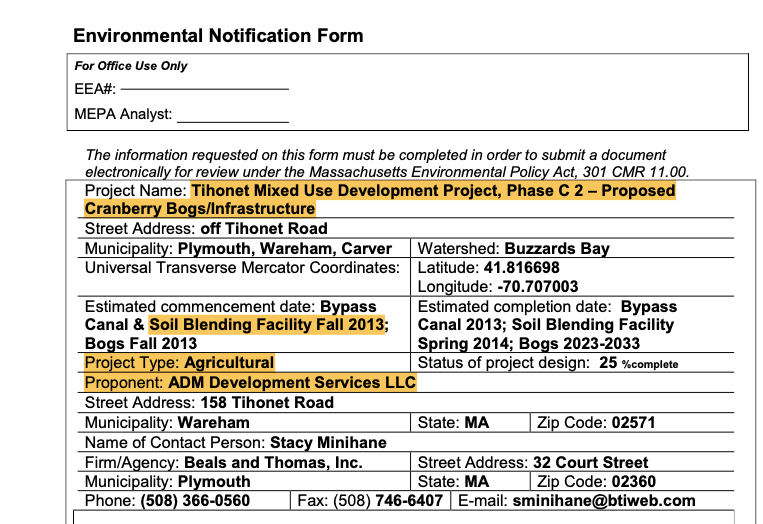
Above: In its 2012 environmental notice to the state Makepeace and Beals+Thomas stated the “Project Type” for Read Custom Soils operation on Federal Road was “Agricultural.” Does this look like an agricultural operation?

Makepeace reported to the state that Read would be located at 46 Federal Road in Carver to have easy access to the sand deposits to the east in Plymouth. This is the Plymouth – Frogfoot strip mine where Makepeace plans to extract 7 million cubic yards of sand and gravel. Falsely portraying the Plymouth mining operation as “agriculture” Makepeace calls the Plymouth strip mine the “Farm of the Future”.
Even though Makepeace and Beals + Thomas always claim the strip mine projects are “agriculture” not one of the sand and gravel sales projects Read brags about on its website is “agricultural”. Instead there are golf courses, athletic fields, and urban roads. The “soil blending” operation is not for cranberry bogs as Makepeace misrepresented to MEPA.
In its 2022 MEPA filing (FEIR) Makepeace’s consultant Beals+Thomas admitted the Read “manufacturing” facility does not exist:
“The soil blending facility was originally proposed to include an office and work space building and associated parking, a covered bin and pallet storage area with an adjacent concrete mixing pad area, a finished material storage building and associated covered areas for blending and storage, a dry-sand storage structure and associated concrete pad for drying sand and a scale. Although the soil blending facility is currently operational, the previously proposed full build-out, which included several buildings totaling 34,450 sf, as well as a 67,140 sf open canopy roof system, has not been undertaken.” MEPA report Page 1-13.
Read more about the Citizen Suit and the story behind Makepeace’s sand mining here.



